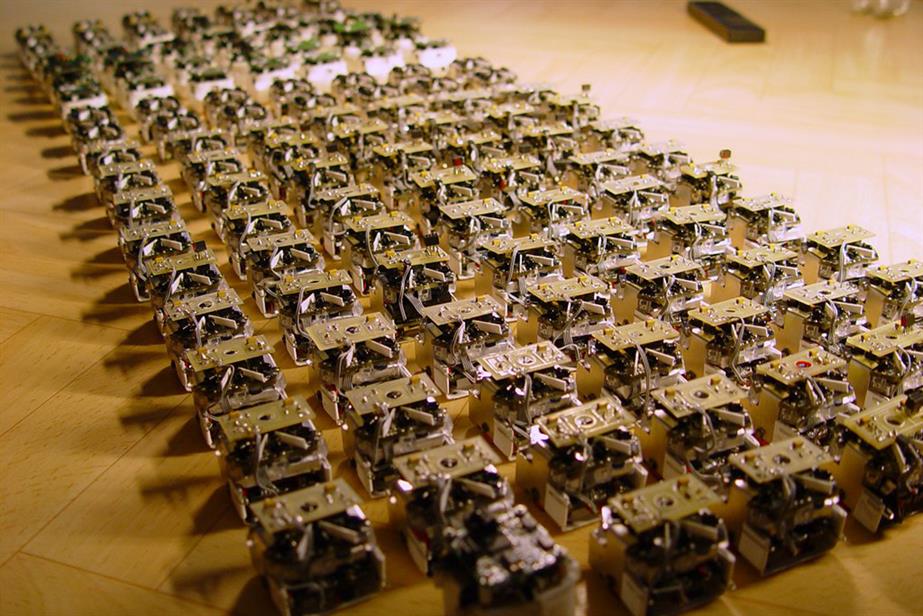'It's all about lists': an extract from Russell Davies' PowerPoint guide for presentation phobics
An extract from Russell Davies' book about the art of the PowerPoint presentation, covering all the reasons you should use lists if you want your presentations to stand out.
Bots and humans: the new interactive tools that could help creatives
Are we entering a new age of interactive design, or is that a load of hype? Russell Davies looks at new tools that could help creative people do their jobs.
Why copywriters could fare well in the age of robots
We're on the edge of inventing a new form of expression between humans and machines, says Russell Davies.
Hello again: Russell Davies is back blogging for ±±ľ©Čüłµpk10
Russell Davies, who was previously at Wieden & Kennedy, Nike, and the Government Digital Service, explains what ±±ľ©Čüłµpk10 readers can expect from his new blog.
Facebook's emotion study offers us all a valuable lesson about openness
I studied Brave New World for O-level. That's how old I am: pre-GCSE. I bet you've come across it somewhere too.
Google is surely putting its energy into making cool stuff, not more advertising
My Twitter stream is currently full of friends attending Google I/O, where it unveils all the cool stuff people are going to be able to build on. It's the usual mixture of excited squeals at clever new things and cynical mutterings about how Google will bend everything it has invented or bought so that it can show you more advertising. But I never worry about that, because I think Google is trying to get out of advertising.
Ikea's lawyers show that overly protecting a brand can be bad for business
One of the things I liked about being a planner was seeing inside businesses - and that almost universal realisation that what everyone thought they were good at wasn't the real key to their success. What Nike is really good at is procurement. What Honda is really good at is culture. What Lego is really good at is manufacturing. That kind of thing.
Our jobs could be under threat from the Eugene Goostmans of the world
Have you seen the movie Transcendence with Johnny Depp? I don't recommend it. Appallingly overblown sci-fi guff about a scientist who gets himself "uploaded" into a computer - becoming a glitchy, screen-based entity spouting platitudes in that spiky green font evil computers always seem to use. I saw it on a rainy afternoon and, as a little coding exercise, I thought I would try to upload my wife.
The web idealists have a point: content can't truly blossom in walled gardens
There's a small and growing movement known as the "IndieWeb". I hear more about it every day.
At least New York Times isn't waiting for the whole digital lark to just go away
The New York Times had a bit of a leak the other week - an internal report on how they were doing at "digital". It was depressingly familiar reading for those who have been trying to get organisations to "do digital" for a very long time, but you have to hand it to them: at least they commissioned a report and they got people who were smart enough to write a really good one.
Introducing supermarkets' new brand ambassadors: cheerful self-checkouts
They're so common now that observational comedians make jokes about how observational comedians no longer make jokes about them.
Robots aren't teaming up with art directors - they're too busy writing the news
On 17 March at 7.53am, the Los Angeles Times ran a story on its website about an earthquake striking near the city: "A shallow magnitude 2.7 earthquake aftershock was reported Monday morning four miles from Westwood, according to the US Geological Survey. The temblor occurred at 7.23am Pacific time at a depth of 4.3 miles."
WhatsApp's scale tells us to alter our tech attitude and focus on evolution
Many years ago, I lived on the West Coast of America and people felt compelled to tell me about their feelings. It was there that I first heard about the idea of learned helplessness. It's a concept from psychology, apparently, first identified by Martin Seligman in the 60s.
The smart businesses are investing in things that will make your clients obsolete
There's nothing that feels more dated than virtual reality. It has been the technology pipe dream for so long that it has a multi-generation history of false hope and disappointment.
Click-through as currency shows how brands have got the internet all wrong
If you haven't seen this in a presentation yet, you'll see it very soon: when teens realised Facebook posts in which brands were mentioned rose higher in the News Feed, they began adding brand names to the end of everything.
Perhaps the era of great change has come to an end - at least in media
Regular readers will know I'm quite fond of noting and quoting my favourite sources for stories and ideas - to a shameless extent, I'm sure some would say. I've always appreciated it when people signpost interesting things to me. But I'm aware I also need to maintain my position of being worthy of signposting too.
It's not what advertising is good at so much as what it can do better
I've always thought that the best advertising people are those who are a bit suspicious of it. That may well be true of other professions. A degree of distance, a measure of not-drinking-the-Kool-Aid, might help you be good at your job. That's certainly true of Tom Ewing of Brainjuicer.
WhatsApp is an intriguing business. But not because it cost a whopping $19bn
The past few days have been filled with spluttering pundits comparing the WhatsApp acquisition by Facebook to some sort of end times. "$19 billion!" they cry. "For what?! They don't even take advertising!" Indeed, they don't.
WhatsApp is an intriguing business. But not because it cost Facebook $19bn
The past few days have been filled with spluttering pundits comparing the WhatsApp acquisition by Facebook to some sort of end times. "$19 billion!" they cry. "For what?! They don't even take advertising!" Indeed, they don't. This is a company that has a blog post that starts by quoting Tyler Durden from Fight Club: "Advertising has us chasing cars and clothes, working jobs we hate so we can buy shit we don't need."



_1.png)


















